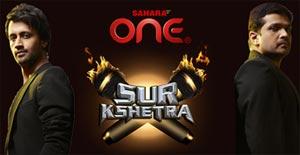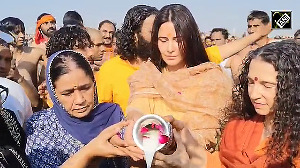 Reality TV show Sur Kshetra is more about aggressive patriotism and less about singing, writes Preeti Arora.
Reality TV show Sur Kshetra is more about aggressive patriotism and less about singing, writes Preeti Arora.Jung ka elaan, Jung ka maidan, Jeet hamari hi hogi television seems louder this weekend, thanks to Sur Kshetra, the latest offering by Gajendra Singh (director of Antakshri and Sa Re Ga Ma Pa).
The promos have been airing for a while now. The hype is in place, and the show is being aggressively pushed through various media. Unfortunately, for the hapless viewers, the aggression isn't restricted to marketing strategies. There is a note of hostility which has consciously been etched in even as the concept was finetuned.
Sur Kshetra, the organisers claim, is a 'musical extravaganza where humungous efforts have been made to locate talent from different cities of both India and Pakistan.' Since cricket hasn't been setting sentiments afire of late, scriptwriters, in desperate search of a money-spinner, ventured out to explore fresh avenues.
So, welcome to Sur Kshetra.
Even before the show premiered on September 8, there was a 30-minute special episode giving us a glimpse of the labour pains which went into this mammoth production. Ideally, it should have been telecast after the show but most of the audience would have switched channels by then.
Ayesha Takia as the hostess obligingly takes us through the routine.
The elimination rounds are taking place and six singers are to be chosen from 10 participants. The 'captain' of the Indian team is Himesh Reshammiya; Atif Aslam helms the Pakistani team.
Given the duration of the show (one and a half hours), there is a pressing need for more footage. So there are carefully staged shots of participants waiting in long queues, drenched in sweat, pouring in as soon as the gates open, the usual gimmicky camera angles, the clenched fists and the high fives.
One aspirant glares malevolently into the camera and mouths 'Phad ke rakh doonga'. Wonder why there is a need for such profanity from the so-called 'bhakts' of
Some are sob stories about participants borrowing money to reach the venue follows.
The judges keep reiterating that they're looking for a strong patriotic spirit, in addition to musical talent, creating the impression that the short-listed six may have to cross the border at Wagah in animosity.
The entire selection process seems fake and contrived. Himesh (with more hair on his head than one has seen in recent times) keeps a straight, almost deadpan face throughout. Every alternate sentence he mouths ends with 'Jai Hindustan' and 'Inshallah'.
In contrast, the mentor for the Pakistani team Atif Aslam maintains a casual and spontaneous note. There is the odd Pakistani participant muttering 'India, you are gone,' but minus the venom and the hatred.
The selection of the Pakistani team took place in the second episode. Despite the tedious attempts to stretch it, the programme ended in one hour and 15 minutes. So you are 'treated' to highlights of subsequent episodes where Runa Laila, Asha Bhosle and Abida Parveen as judges will take the show forward.
While music reality shows have played an important role in providing strugglers with a much-needed break in Bollywood, this is one show we could have easily done without simply because it's designed in a manner likely to create animosity and bad blood.
Rediff Rating: 











 © 2025
© 2025